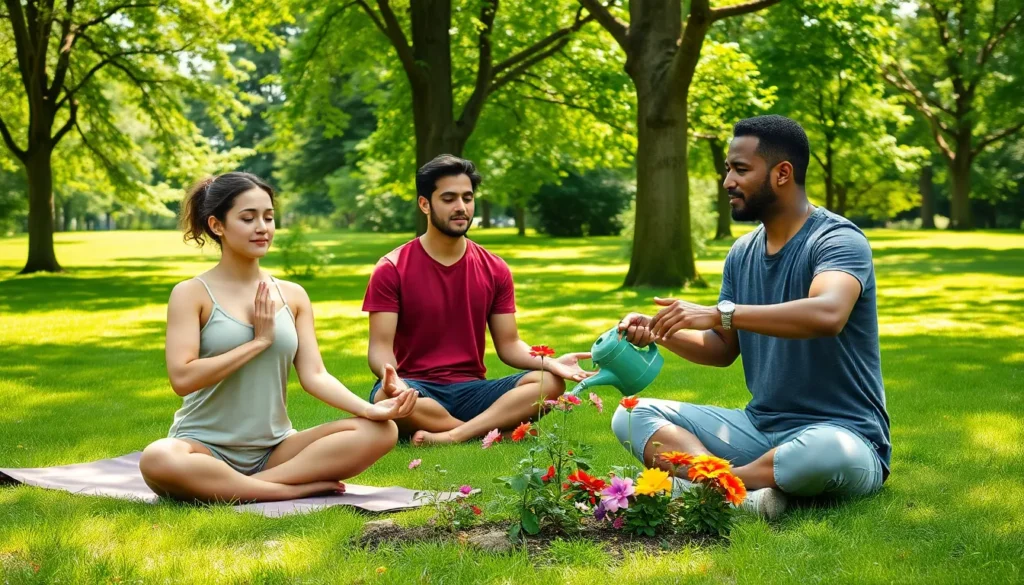Table of Contents
ToggleIn a world filled with chaos and constant distractions, the quest for a harmonious life has never been more relevant. Many seek balance, aiming to align their inner selves with their external environments. This pursuit isn’t just about achieving peace; it’s about fostering well-being and fulfillment in every aspect of life.
Creating harmony involves understanding the interconnectedness of mind, body, and spirit. It requires intentional choices and practices that nurture relationships, promote health, and encourage personal growth. By embracing this holistic approach, individuals can cultivate a life that resonates with joy and purpose, transforming everyday experiences into opportunities for deeper connection and satisfaction.
Understanding Harmonious Life
A harmonious life encompasses aligning one’s inner self with the external world. This alignment fosters overall well-being and personal fulfillment, enabling individuals to cultivate joy and meaningful connections.
Definition of Harmonious Life
A harmonious life refers to a balanced state wherein individuals experience inner peace while navigating their external environment. Elements such as emotional well-being, mental clarity, and spiritual connection play vital roles in achieving this state. Achieving harmony requires an understanding of how mind, body, and spirit interconnect, urging individuals to make intentional choices that promote balance.
Importance of Harmonious Life
A harmonious life significantly impacts various aspects of existence. It enhances mental clarity, sharpens focus, and reduces stress, contributing to improved emotional resilience. It strengthens relationships by fostering empathy and effective communication. Additionally, harmonious living promotes better health through improved lifestyle choices and encourages personal growth, leading to higher life satisfaction. Maintaining harmony in daily life creates opportunities for joy, purpose, and fulfillment, ultimately transforming everyday experiences into meaningful connections.
Key Components of Harmonious Life

Achieving a harmonious life relies on several core components that intertwine to enhance overall well-being. These components include balance in relationships, personal well-being, and connection with nature.
Balance in Relationships
Balance in relationships fosters mutual respect, understanding, and support. Healthy relationships enhance emotional stability and contribute to a harmonious life. Prioritizing open communication ensures that both individuals express their needs and feelings. Establishing boundaries prevents burnout and promotes individual autonomy. Cultivating empathy strengthens connections, encouraging both parties to navigate challenges collaboratively. Engaging in shared activities fosters bonding, reinforcing the emotional foundation of relationships.
Personal Well-being
Personal well-being encompasses mental, emotional, and physical health. Regular practices such as mindfulness and meditation promote mental clarity, reducing stress levels significantly. Maintaining a balanced diet and engaging in regular physical activity supports physical health, enhancing energy levels and mood. Setting aside time for self-care activities allows individuals to recharge and reflect. Establishing personal goals fosters a sense of purpose and achievement, essential for overall happiness. Practicing gratitude enhances emotional resilience, contributing positively to mental well-being.
Connection with Nature
Connection with nature plays a vital role in achieving a harmonious life. Spending time outdoors reduces stress and improves mood. Engaging in activities such as hiking or gardening promotes physical activity and mindfulness. Nature therapy, or ecotherapy, is scientifically backed for its positive effects on mental health. Observing natural beauty encourages a sense of awe and gratitude, enhancing overall emotional well-being. Prioritizing nature immersion fosters appreciation for the environment, promoting sustainable living practices that contribute to global harmony.
Strategies for Achieving a Harmonious Life
Achieving a harmonious life requires intentional strategies that focus on enhancing well-being and fostering balance. The following approaches support individuals on their journey toward harmony.
Mindfulness Practices
Engaging in mindfulness practices cultivates present-moment awareness, reducing stress and enhancing emotional regulation. Techniques such as meditation, deep breathing, and yoga encourage individuals to connect with their inner selves. Regular mindfulness routines improve focus and clarity, enabling individuals to better handle life’s challenges. Setting aside just 10–15 minutes daily for mindfulness can lead to significant emotional benefits.
Healthy Lifestyle Choices
Adopting healthy lifestyle choices profoundly impacts overall harmony. Balanced nutrition supports mental and physical well-being, while regular exercise boosts energy levels and reduces anxiety. Prioritizing sleep is essential, as it restores the body and mind, enhancing emotional resilience. Staying hydrated also plays a critical role in maintaining cognitive function and mood stability. Making conscious choices like incorporating whole foods and regular physical activity contributes to holistic health.
Positive Social Interactions
Cultivating positive social interactions strengthens connections and enhances emotional well-being. Building relationships based on empathy and understanding fosters support systems that promote resilience. Engaging in meaningful conversations and active listening improves communication and conflict resolution. Participating in community activities or volunteering creates a sense of belonging and purpose. Nurturing social connections contributes significantly to overall life satisfaction and harmony.
Challenges to Maintaining a Harmonious Life
Maintaining a harmonious life involves navigating various challenges that can disrupt balance and well-being. Understanding these obstacles is crucial for developing effective strategies.
Stress and Anxiety
Stress and anxiety serve as significant barriers to achieving harmony. Excessive work demands, personal obligations, and emotional turmoil contribute to heightened tension. Individuals face difficulties in managing responsibilities, leading to burnout and diminished focus. Stress triggers physiological responses, impacting both mental and physical health. Effective management techniques, such as breathing exercises, time management skills, and structured support from professionals, can mitigate these challenges. Practicing mindfulness also aids in recognizing stress triggers, fostering emotional resilience.
Environmental Factors
Environmental factors greatly influence the pursuit of a harmonious life. Urban settings often contribute to noise pollution, overcrowding, and a fast-paced lifestyle, which can hinder mental clarity. Natural environments positively affect mood and well-being; however, access to green spaces may be limited in urban areas. Negative surroundings can lead to feelings of isolation and anxiety, making it difficult to maintain a positive mindset. Creating a personal sanctuary at home, utilizing calming decor, or incorporating natural elements can enhance tranquility. Additionally, reducing exposure to unpleasant stimuli, such as clutter or aggressive media, promotes a more harmonious living space.
Embracing a harmonious life leads to profound transformations in daily experiences. By prioritizing balance in relationships and personal well-being individuals can cultivate a sense of peace that resonates throughout their lives. This journey requires intentional choices and mindfulness practices that foster emotional clarity and strengthen connections.
Recognizing the interconnectedness of mind, body, and spirit is essential for achieving lasting fulfillment. Overcoming challenges like stress and environmental distractions further enhances one’s ability to maintain harmony. Ultimately, the pursuit of a harmonious life not only enriches personal experiences but also contributes to a more joyful and purposeful existence.







